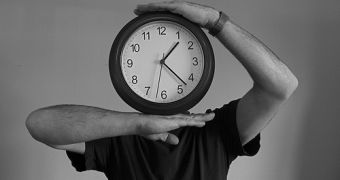University College London scientists carried out a study in an attempt to find out where does humans' sense of time come from.
They concluded that people use their senses to keep track of short intervals of time, which means that the internal body clock that no one has located so far, is not the only one maintaining our perception of time.
The final conclusions were based on two very important experiments.
In the first one, twenty study participants watched small circles of light appearing on a screen, twice in a row, and had to say which one lasted longer.
The participants had a better judgment when the circles were accompanied by a mottled pattern programmed to change randomly, but with a regular average rate.
This suggests that they used the rate of change in the patterns to estimate the passing of time.
For the second experiment, the authors asked the participants to judge how long the mottled patterns themselves lasted, but varied the rates at which those patterns changed.
As a result, when the patterns changed faster, participants estimated they lasted longer, and this confirms that sensory change influences our perception of time.
The study shows that our estimation of time comes from observing how much the world changes, because we have learned to expect our sensory inputs to change at a particular 'average' rate.
We judge how much time has passed by comparing the change we see to this average rate, and this is what allows us to have an 'internal clock'.
“There are many proposals for how an internal clock might work, but no one has found a single part of the brain that keeps track of time,” said Dr Maneesh Sahani, from the UCL Gatsby Computational Neuroscience Unit, an author of the paper said.
“It may be that there is no such place, that our perception of time is distributed across the brain and makes use of whatever information is available.
"Our sense of time is affected by outside stimuli, and is therefore highly mutable, which is something that resonates with people's feeling about the passing of time, he added.
“It is possible to bias people's perception of time, which does not fit with the idea of a rigid internal brain clock.
Dr. Misha Ahrens, the first author of the study and a UCL graduate student when the study was conducted, said that “the answer to why this happens is that part of our perception of time is based on changing sensory input from the outside world, which we can use to improve our judgments of time in an environment where rate of change is likely to be reliable.”
This study was published online in Current Biology.

 14 DAY TRIAL //
14 DAY TRIAL //